There is a common perception that all therapists are empathetic towards everyone, and have the training and sensitivity to keep bias out of their practice.
But intolerance towards LGBTQIA people can happen in professional counseling – and when it does occur, it can be incredibly damaging to a person’s sense of self-worth.
In this guide, we’ll discuss what affirming therapy is. We’ll also go over the five best LGBTQIA therapy platforms to help you connect with a licensed professional who will help you feel comfortable and confident in your own skin.
Want to skip right to the suggestions for LGBT-friendly therapists? Here are our 5 recommended therapy solutions:
How to Find an LGBTQ Friendly Therapist Near Me
The quality of mental health care for LGBTQIA people varies greatly depending on where you live.
If you keep searching a LGBTQIA-affirming therapist near me to no avail, online therapy might be worth looking into. With virtual counseling, you can connect with a queer therapist who will make you feel understood and supported, no matter where you live.
| Provider | Good For | Location | Pricing |
|---|---|---|---|
| BetterHelp | Quick match with the right therapist four you | Online therapy | $65 to $90 per week (billed every 4 weeks) |
| Find-a-therapist.com | Finding and contacting the right therapist for you | Online and in-person therapy | Varies depending on the counselor fee |
| Online-therapy.com | Finding licensed and experienced therapists with a Cognitive Behavioral Therapy (CBT) approach | Online therapy | $40/week to $88/week (including our 20% discount first month) |
| Calmerry | Depression therapy, online grief counseling, anxiety therapy, therapy for OCD, self-esteem therapy, LGBT-friendly therapy | Online therapy | $49.50 to $73.75 per week (billed monthly) |
| TalkSpace | Depression, anxiety, bipolar disorder, OCD, PTSD, psychiatry | Online therapy | Varies according to insurance coverage or self-pay options |
1. BetterHelp
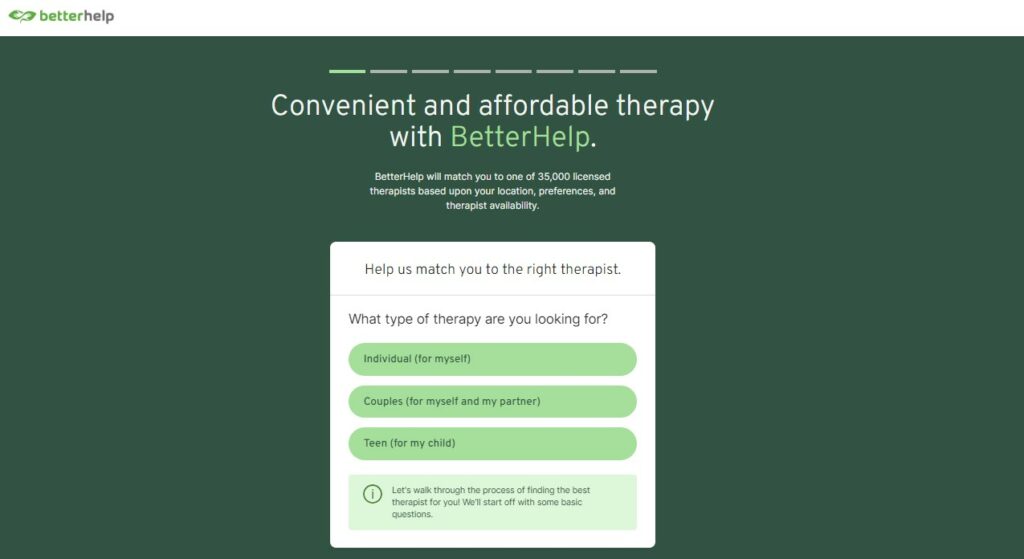
Explore emotional well-being with BetterHelp – your partner in affordable online therapy. With 30,000+ licensed therapists and plans starting from only $65 per week, BetterHelp makes self-care accessible to all. Complete the questionnaire to match with the right therapist.
- Good for: Quick match with the right therapist four you.
- Location: Online therapy.
- Pricing: $65 to $90 per week (billed every 4 weeks).
- Features: iOS and Android app available, message your therapist anytime, live sessions are scheduled weekly and done via live chat, phone, or video call.
BetterHelp is one of the largest and most popular online therapy services. You can choose if you want to be matched with a therapist who specializes in LGBTQ+ topics, such as sexual orientation, gender identity, transgender issues, queer issues, and more.
Read our BetterHelp review here.
2. Find-a-therapist.com
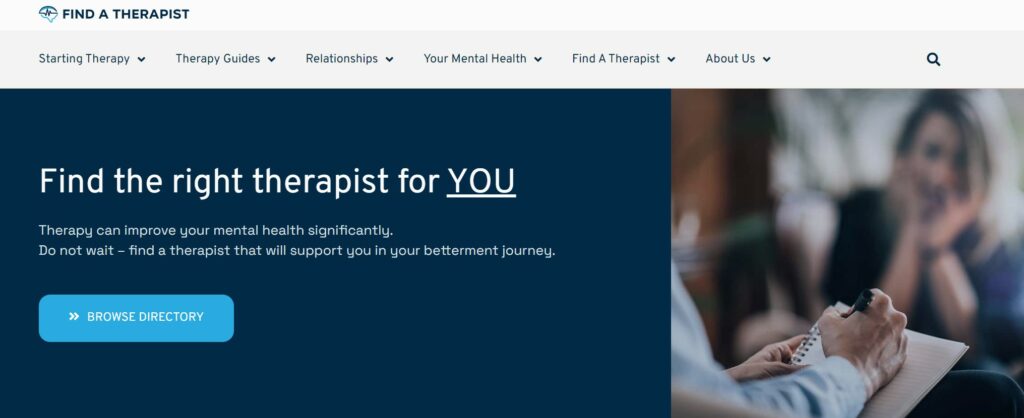
- Good for: Finding and contacting the right therapist for you.
- Location: Online and in-person therapy.
- Pricing: Varies depending on the counselor fee.
- Features: Filter your search, find accessible and effective online and in-person therapy, find guides on different types of therapy.
Find-a-therapist.com offers an online directory where you can search for an LGBTIQ+-affirming therapist who meets your needs. There, you can check the profiles of therapists like Matthew Crane, Jeffrey Gianelli, or Marie Cordray, who have experience in LGBTIQ+ issues.
3. Online-therapy.com
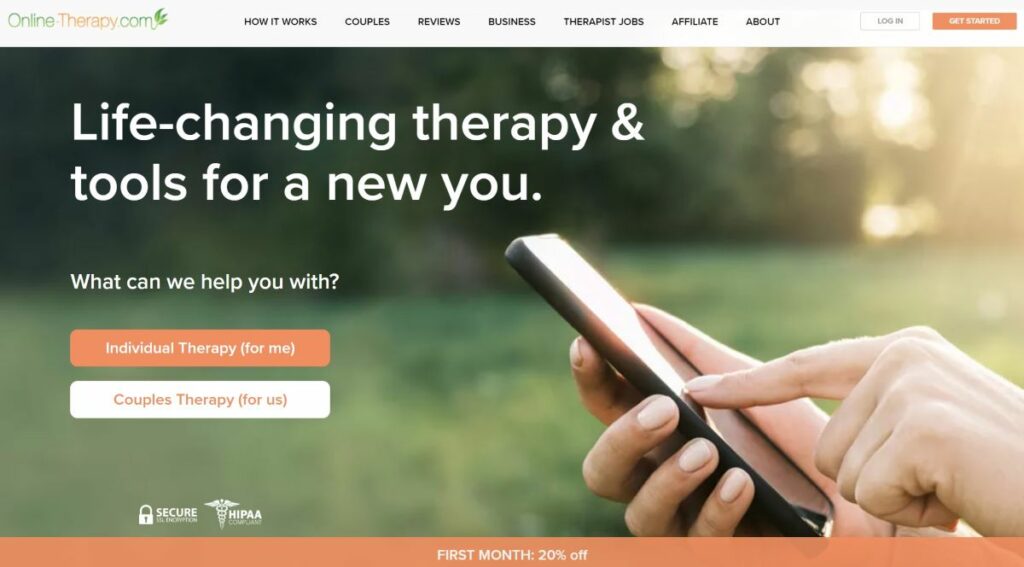
Discover transformative online therapy with Online-therapy.com. Through cognitive behavioral therapy (CBT), Online-therapy.com offers individual and couples support starting at $45/week. Engage in sessions via video, voice, or text for maximum flexibility. Fill out their online questionnaire to get started.
- Good for: Finding licensed and experienced therapists with a Cognitive Behavioral Therapy (CBT) approach.
- Location: Online therapy.
- Pricing: $40/week to $88/week (including our 20% discount first month).
- Features: Unlimited messaging with your therapist, including a daily journal and activity plan, yoga and meditation videos, and tests to see your progress.
Online-therapy.com is a Cognitive-Behavioral Therapy (CBT) platform that offers CBT sessions for LGBTIQ+ people through your phone or computer. CBT sessions can help you understand and come to terms with any negative self-talk and toxic thoughts that are undermining your happiness and self-worth.
Read our online-therapy.com review here.
4. Calmerry

Embark on a journey of mental wellness with Calmerry. With diverse subscription options, starting at just $50, Calmerry makes prioritizing your mental health simple and accessible. You can message your therapist any day or schedule a live therapy session from the comfort of your home from any device.
- Good for: Depression therapy, online grief counseling, anxiety therapy, therapy for OCD, self-esteem therapy, LGBT-friendly therapy.
- Location: Online therapy.
- Pricing: $49.50 to $73.75 per week (billed monthly).
- Features: Message to your counselor anytime, text therapy and video therapy according to the plan you choose, free counselor switching.
In Calmerry, you will be matched with an LGBTIQ+-affirming therapist after you fill out a questionnaire. Once a therapist is assigned, you can communicate with them via text, voice, or video call according to your preferences.
Read our comparison between Calmerry and BetterHelp here.
5. TalkSpace
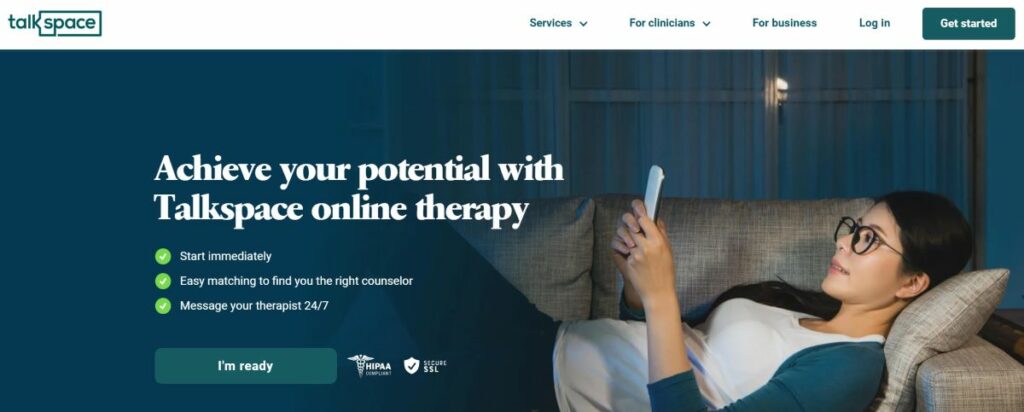
Tailored to individuals, couples, teens, and offering psychiatry services, Talkspace plans kick off at a wallet-friendly $69 per week. What’s more, many health insurances also cover their services, enhancing accessibility and affordability. Complete a questionnaire and get matched with the right therapist for you.
- Good for: Depression, anxiety, bipolar disorder, OCD, PTSD, psychiatry.
- Location: Online therapy.
- Pricing: Varies according to insurance coverage or self-pay options.
- Features: Accepts insurance, pick your therapist from a list of recommendations, live video sessions and unlimited messaging with your therapist, medication management.
TalkSpace helps you connect with an LGBT+affirming therapist according to your needs and preferences. In this platform, you can choose between different plans considering your finances and also your insurance coverage.
Read our TalkSpace review here.
Mental Health and the LGBT Community
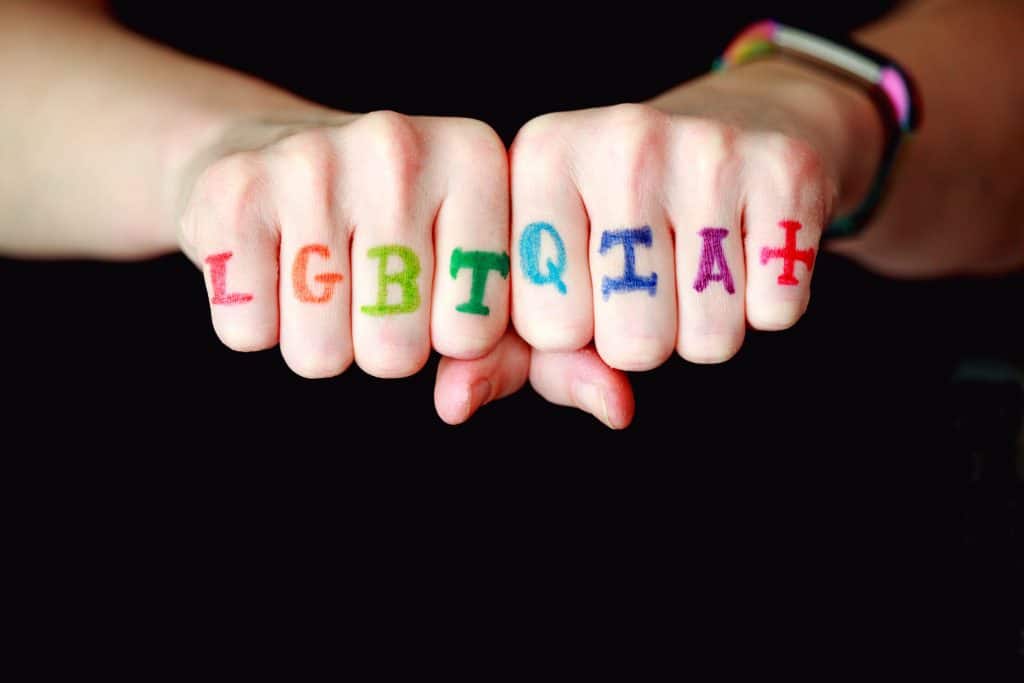
Because we live in a heteronormative society, being a part of the LGBTQIA community is sometimes considered unusual or even wrong. Those who don’t fit into our collectively created gender expression boxes are often treated differently, and some people are even bullied or assaulted as a result of their gender identity.
Because of the overt and covert homophobia, biphobia, lesbophobia, and transphobia that continues to exist in the world, these phobias can become internalized within LGBTQIA individuals and become the narrative that runs in their mind. When you internalize the collective belief that your existence is “not normal” or “unnatural”, this can have devastating consequences on your psyche and overall well-being.
We all have an inner critic that often makes us feel like we’re not good enough. But as an LGBTQIA person, you not only deal with your own inner critic, but also the societal judgments and hurtful opinions of others. It’s no wonder why over half of the LGBTQIA population struggles with depression and trauma-related disorders.
LGBT Affirming vs LGBT Friendly Therapists

Being an affirming therapist means that you understand that identifying as LGBTQIA is normal, and help clients work towards self-acceptance of their gender identity and sexual orientation. Affirming therapists focus on the trauma that LGBTQIA people suffer from growing up in a heteronormative and often homophobic and transphobic society.
Unfortunately, some therapists and other professionals in clinical social work view heterosexuality as the norm, and everything else as a deviation from that. Even the most well-intentioned providers can create an unwelcoming environment for LGBTQIA clients through their body language or choice of words if they have not been properly trained.
Not everyone is aware of the fact that there is a difference between LGBTQIA-friendly and LGBTQIA-affirming therapy. Because many of us have grown up in a world that has negated or minimized the LGBTQIA and queer community and their experiences, there is a lot of misinformation that is passed around. Graduate psychology programs have not traditionally focused on the special circumstances that come with working with this part of the population.
An LGBTQIA-friendly or transgender therapist may be an open-minded person who has never felt any sort of ill feelings towards LGBTQIA people. They may have gay or transgender friends or may even identify as queer themselves. While LGBTQIA-friendly therapists can provide a lot of support for their clients, that doesn’t necessarily mean they know how to properly address the specific kind of traumas that so many in the LGBTQIA community face on a daily basis.
What Happens During a Session With an LGBT Affirming Therapist?

During a counseling session with a gay-affirming therapist, you can talk about whatever you want. For example, you may be seeking counseling sessions specifically to find out who you are and what you want, in terms of what types of people you might want romantic or sexual relationships with.
Perhaps you’re feeling a dissonance between your inner world and your outward appearance and want to talk to a professional about gender expression. You might also choose to talk about familial relationships or past traumas that are negatively impacting you.
You may want to discuss your views on marriage and family and explore if that is something you want for yourself. Or maybe there is a specific situation at work you’re struggling to deal with.
Whatever you bring to your sessions, a good LGBTQIA affirming therapist will have a deep understanding of the traumas you are facing and will be better able to listen, support, and serve you in working through your problems.
During the session, therapists may use a number of different counseling techniques, depending on the type of help you need. For example, Cognitive-Behavioral Therapy (CBT) may be used to help you deal with challenging situations at home, or to help with depression/anxiety.
CBT therapists will help you to develop personal coping strategies to manage these challenging situations, helping you to regulate your emotions, even in challenging circumstances.
Conclusion
By acknowledging and respecting the unique experiences of the LGBTQ+ community, affirming therapists contribute to a broader movement toward inclusivity in mental health care, reinforcing the belief that everyone deserves access to affirming and compassionate support on their journey to mental and emotional wellness.
Still not sure how best to get help? Feel free to contact us, and we’ll get back to you as soon as possible.





